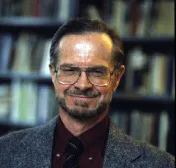Religion and Globalization: A Thai Buddhist Perspective

Tuesday, February 6 at 4:30, Scheuer Room, Swarthmore College
A Talk by Donald K. Swearer
Distinguished Visiting Professor of Buddhist Studies, Director of the Center for the Study of World Religions, and Associate Dean for Faculty and Curricular Affairs, Harvard Divinity School. Professor Emeritus, Department of Religion, Swarthmore College.
Historically when the so-called "world religions" have taken root and flourished in various regions they have adapted to different cultures. Inevitably these adaptations have produced tensions between their normative-universal and culturally-particular dimensions.
In contemporary terms we might say that world religions have been a "globalizing" force and their cultural adaptations or contextualizations reflect a process of "glocal-ization." For example, although Buddhism across Southeast Asia is referred to as "Theravada" and the monastic lineages of the region share some things in common, they developed unique forms of teaching and practice within particular geographic and cultural contexts.
In this talk we will consider three phases of globalization/glocalization within the historical framework of Thai Buddhism: the formation of the early monarchical Thai states beginning in the 13th century; the development of the modern nation state (Siam) from the mid-19th into the early 20th century; and the emergence of Engaged Buddhism today. Each of these phases involve transformations of what it meant to be/what it means to be Thai (Buddhist).
Professor Swearer will also be available to talk with students interested in graduate work in the fields of Religious Studies, and in the study of religion at Harvard and Harvard Divinity School in particular:
Tuesday, Feb 6:
Open Lunch: 1:45-2:30, Tarble in Clothier
Open Discussion: 3:00-4:20, Pearson Hall Seminar Room (210), Department of Religion



